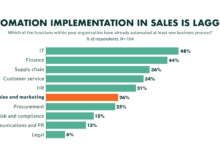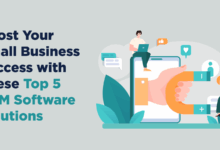CRM with AI Chatbot Integration
CRM with AI Chatbot Integration represents a significant advancement in customer relationship management. This powerful combination leverages artificial intelligence to automate tasks, personalize interactions, and ultimately enhance the customer experience. By integrating AI-powered chatbots, businesses can streamline communication, improve efficiency, and gain valuable insights into customer behavior, leading to increased sales and improved customer satisfaction. This exploration delves into the functionalities, benefits, challenges, and future trends associated with this transformative technology.
The seamless integration of AI chatbots within CRM systems offers a multifaceted approach to optimizing business operations. From automating routine inquiries to providing personalized support, these intelligent systems significantly reduce the workload on human agents, allowing them to focus on more complex issues. Moreover, the data collected through chatbot interactions offers valuable insights into customer preferences, enabling businesses to tailor their strategies for greater success. This detailed examination will cover various aspects of this powerful technology, including implementation strategies, potential challenges, and real-world examples of successful integration.
Defining CRM with AI Chatbot Integration
A Customer Relationship Management (CRM) system, enhanced by the integration of an AI chatbot, represents a powerful tool for businesses aiming to streamline operations, improve customer service, and boost sales. This combination leverages the organizational capabilities of a CRM with the personalized, readily available assistance of AI.
Core Functionalities of a CRM System
CRM systems are designed to manage and analyze customer interactions and data throughout the customer lifecycle. Core functionalities typically include contact management (storing and organizing customer information), sales management (tracking leads, opportunities, and sales processes), marketing automation (managing marketing campaigns and communications), customer service (handling inquiries and resolving issues), and reporting and analytics (providing insights into customer behavior and performance). These functionalities work together to provide a holistic view of the customer, allowing businesses to personalize interactions and improve customer satisfaction.
Types of AI Chatbots Used in CRM Integration
Several types of AI chatbots enhance CRM capabilities. Rule-based chatbots operate on pre-defined rules and scripts, offering simple, structured responses. These are suitable for handling frequently asked questions. Machine learning (ML) chatbots learn from past interactions and improve their responses over time, providing more nuanced and personalized support. Natural Language Processing (NLP) chatbots are designed to understand and respond to human language more naturally, allowing for more complex and open-ended conversations. Finally, hybrid chatbots combine elements of rule-based, ML, and NLP approaches to offer a comprehensive solution.
Examples of AI Chatbots Enhancing CRM Capabilities
AI chatbots significantly enhance CRM capabilities. For instance, they can handle a high volume of customer inquiries simultaneously, freeing up human agents to focus on more complex issues. They provide instant support 24/7, improving customer satisfaction and reducing wait times. Furthermore, AI chatbots can personalize customer interactions by using data from the CRM system to tailor responses and offer relevant product recommendations. By analyzing customer interactions, they can also identify potential issues and proactively address them, preventing churn and improving customer loyalty. Consider a scenario where a chatbot identifies a customer expressing frustration with a product; it can immediately escalate the issue to a human agent for prompt resolution.
Comparison of CRM Platforms with AI Chatbot Integration
The following table compares several CRM platforms offering AI chatbot integration, considering features, pricing, and target audience. Note that pricing can vary based on the number of users and features selected.
| CRM Platform | AI Chatbot Features | Pricing | Target Audience |
|---|---|---|---|
| Salesforce Einstein | Intelligent lead scoring, personalized recommendations, automated responses | Variable, based on plan | Large enterprises, mid-sized businesses |
| HubSpot | Conversational bots, live chat integration, automated workflows | Variable, based on plan | Small to large businesses |
| Microsoft Dynamics 365 | Intelligent chatbots, sentiment analysis, knowledge base integration | Variable, based on plan | Large enterprises, mid-sized businesses |
| Zoho CRM | AI-powered chatbots, automated email responses, lead qualification | Variable, based on plan | Small to large businesses |
Benefits of Integrating AI Chatbots into CRM
Integrating AI chatbots into your CRM system offers a multitude of advantages, significantly enhancing customer interactions, streamlining sales processes, and boosting overall operational efficiency. This integration allows businesses to leverage the power of automation and artificial intelligence to improve customer service, increase sales, and reduce operational costs.
Improved Customer Service
AI chatbots provide instant, 24/7 customer support, addressing common queries and resolving simple issues without human intervention. This immediate responsiveness significantly improves customer satisfaction. Chatbots can handle multiple customer interactions simultaneously, reducing wait times and ensuring a consistently positive experience. Furthermore, they can be programmed to provide personalized responses based on customer data stored within the CRM, leading to more tailored and effective support. For example, a chatbot could greet a returning customer by name and offer assistance based on their past purchase history. This personalized approach fosters stronger customer relationships and loyalty.
Enhanced Sales Efficiency and Lead Generation
AI chatbots can automate lead qualification and nurturing processes. By engaging potential customers through proactive chat interactions on websites or social media, chatbots can gather valuable information, qualify leads based on pre-defined criteria, and route qualified leads to the appropriate sales representatives. This automation frees up sales teams to focus on closing deals and building relationships with high-potential leads. For instance, a chatbot could pre-qualify leads by asking questions about their needs and budget, ensuring sales representatives only contact truly interested prospects. This targeted approach significantly improves sales conversion rates and reduces wasted time on unqualified leads.
Increased Operational Efficiency Through Automation
AI chatbot integration streamlines numerous operational tasks, leading to increased efficiency across the board. Automated responses to frequently asked questions free up human agents to handle more complex issues, reducing workload and improving response times. Chatbots can also automate appointment scheduling, data entry, and other administrative tasks, freeing up valuable employee time for more strategic activities. Imagine a scenario where a customer service team spends hours daily answering repetitive questions about shipping policies. An AI chatbot can handle these inquiries instantly, allowing the team to focus on solving more complex customer problems or proactively engaging with customers. This improved efficiency directly impacts productivity and overall business performance.
Cost Savings Through AI Chatbot Implementation
Implementing AI chatbots can lead to significant cost savings in several ways. Firstly, the automation of routine tasks reduces the need for a large customer service team, lowering labor costs. Secondly, improved lead qualification leads to a higher conversion rate, increasing revenue with fewer marketing and sales efforts. Finally, the reduction in manual data entry and administrative tasks saves time and resources. For example, a company might reduce its customer service team by 10% after implementing an effective chatbot, leading to significant savings in salaries and benefits. The increased efficiency and improved lead conversion rates also contribute to a higher return on investment (ROI) for the business.
Implementation and Integration Challenges
Integrating an AI chatbot into a CRM system presents several technical and strategic hurdles. Successful implementation requires careful planning, robust technical expertise, and a clear understanding of potential pitfalls. The complexity increases significantly depending on the sophistication of both the chatbot and the CRM system, as well as the desired level of integration.
Technical Aspects of AI Chatbot Integration
The technical integration process involves several key steps. First, a suitable API (Application Programming Interface) must be established between the chatbot platform and the CRM. This API allows for seamless data exchange and communication. Next, developers must configure the chatbot to access and utilize relevant CRM data, such as customer profiles, purchase history, and support tickets. This often requires custom coding and potentially the creation of middleware to bridge any compatibility gaps. Finally, thorough testing is crucial to ensure the integrated system functions correctly and reliably, handling various scenarios and edge cases. For example, integrating a Dialogflow chatbot with Salesforce might require custom code to handle Salesforce’s unique data structures and security protocols. This process necessitates expertise in both chatbot development and CRM system administration.
Data Integration and Security Challenges
Data integration presents significant challenges, particularly regarding data consistency and security. Ensuring data accuracy across both systems is paramount. Discrepancies can lead to incorrect information being presented to customers, impacting customer experience and potentially damaging the brand’s reputation. Security is equally critical. The integration process must adhere to stringent security protocols to protect sensitive customer data. This includes measures such as encryption, access control, and regular security audits. For example, a breach exposing customer personal information through a poorly integrated chatbot could result in significant financial and reputational damage, including potential legal ramifications.
Strategies for Overcoming Integration Complexities
Several strategies can help mitigate integration complexities. A phased rollout approach, starting with a pilot project involving a limited number of users and functionalities, allows for iterative improvements and reduces the risk of widespread failures. Thorough planning and documentation, including detailed specifications and workflows, are crucial for efficient development and troubleshooting. Choosing a chatbot platform and CRM system that are compatible and offer robust API capabilities simplifies the integration process. Selecting a vendor experienced in AI chatbot integration with your specific CRM system can significantly reduce the technical hurdles and ensure successful implementation. Regular monitoring and maintenance are also vital to address any issues promptly and maintain optimal performance.
Step-by-Step Implementation Guide
- Needs Assessment and Planning: Define the chatbot’s purpose, functionality, and desired level of CRM integration. Identify key performance indicators (KPIs) to measure success.
- Chatbot Platform Selection: Choose a chatbot platform compatible with your CRM system and offering the necessary features and scalability.
- API Integration: Establish a secure and reliable API connection between the chatbot and CRM system. This may involve custom development or the use of pre-built integrations.
- Data Mapping and Transformation: Map the data fields between the chatbot and CRM, ensuring data consistency and accuracy. This may involve data transformation to align different data formats.
- Security Configuration: Implement robust security measures to protect sensitive customer data, including encryption and access control.
- Testing and Quality Assurance: Conduct thorough testing to identify and resolve any bugs or integration issues. Include both unit and integration testing.
- Deployment and Monitoring: Deploy the integrated system and monitor its performance, making adjustments as needed. Regular monitoring is key for ongoing optimization and identifying potential problems.
Case Studies and Real-World Examples
The successful integration of AI chatbots into CRM systems has yielded significant improvements across various industries. Examining real-world applications demonstrates the tangible benefits and addresses common implementation hurdles. The following case studies highlight the transformative impact of this technology.
Case Study: Improved Customer Service at a Major E-commerce Retailer
Company X, a large online retailer, implemented an AI-powered chatbot within its CRM system to handle customer inquiries related to order tracking, returns, and product information. Prior to implementation, the company experienced high call volumes and long wait times, leading to customer frustration and negative reviews. The AI chatbot, trained on a vast dataset of customer interactions and product information, significantly reduced the burden on human agents. The chatbot handled over 70% of routine inquiries, freeing up human agents to focus on more complex issues. This resulted in a 30% reduction in average call handling time and a 15% increase in customer satisfaction scores, as measured by post-interaction surveys. The system also learned and adapted over time, improving its accuracy and efficiency in handling customer requests. Furthermore, the chatbot provided valuable data insights into common customer issues, enabling the company to proactively address product defects and improve its customer service processes.
Examples of Improved Customer Satisfaction
Several businesses have leveraged AI-powered CRM chatbots to boost customer satisfaction. For example, a financial institution saw a marked decrease in customer complaints after implementing a chatbot capable of instantly answering questions about account balances and transaction history. Similarly, a telecommunications company reported a significant rise in customer retention rates following the deployment of a chatbot that efficiently resolved technical issues and provided personalized support. These improvements are largely attributable to increased response speed, 24/7 availability, and personalized interactions facilitated by the AI chatbots.
Industry Applications of AI-Powered CRM Systems
AI-powered CRM systems find applications across a broad range of industries. In the financial services sector, chatbots assist with account management, fraud detection, and regulatory compliance. Within the healthcare industry, they streamline appointment scheduling, patient communication, and medication reminders. In the retail sector, they enhance customer service, personalize recommendations, and optimize marketing campaigns. The manufacturing industry benefits from improved supply chain management and enhanced customer support through AI-powered CRM integrations. Each industry adapts the technology to address its unique challenges and leverage its strengths.
Addressing Implementation Challenges
Several companies have successfully navigated the challenges associated with integrating AI chatbots into their CRM systems. For example, Company Y, a mid-sized software company, initially struggled with data integration issues. They overcame this by implementing a robust data pipeline and investing in data cleansing and standardization processes. Company Z, a global logistics provider, faced challenges related to chatbot training and accuracy. They addressed this by using a hybrid approach, combining AI-powered automation with human oversight and continuous feedback loops to refine the chatbot’s performance. These examples illustrate that careful planning, appropriate resource allocation, and a phased implementation approach are crucial for successful integration.
Future Trends and Developments
The integration of AI chatbots into CRM systems is rapidly evolving, promising a future where customer interactions are more personalized, efficient, and insightful. This evolution is driven by advancements in machine learning and deep learning, leading to increasingly sophisticated chatbot capabilities and a deeper understanding of customer behavior. We are moving beyond simple rule-based systems towards AI that can learn, adapt, and anticipate customer needs.
The potential impact of emerging technologies on CRM with AI chatbot integration is significant. Machine learning algorithms are refining chatbot responses, enabling them to handle a wider range of queries and provide more accurate and relevant information. Deep learning models are enhancing natural language processing (NLP) capabilities, allowing for more natural and human-like conversations. This increased sophistication translates into improved customer satisfaction, increased sales conversion rates, and more efficient customer service operations.
The Evolving Role of AI in CRM Systems
AI is transitioning from a supporting role to a central component within CRM systems. Initially used for basic tasks like lead qualification or scheduling appointments, AI is now being employed for more complex functions such as sentiment analysis, predictive modeling, and personalized recommendations. This shift is driven by the increasing availability of large datasets and the development of more powerful algorithms. For example, AI can analyze customer interactions to identify patterns and predict future behavior, enabling proactive customer service and targeted marketing campaigns. This proactive approach allows businesses to address potential issues before they escalate, leading to improved customer retention and loyalty.
The Impact of Machine Learning and Deep Learning
Machine learning is empowering CRM systems to learn from past interactions and improve their performance over time. For instance, a machine learning algorithm can analyze historical customer data to identify the factors that contribute to successful sales conversions. This information can then be used to personalize marketing messages and improve the effectiveness of sales outreach. Deep learning, a more advanced form of machine learning, is enabling chatbots to understand the nuances of human language and respond more naturally to customer inquiries. Deep learning models can also be used to analyze unstructured data, such as customer reviews and social media posts, to gain valuable insights into customer sentiment and preferences. For example, a deep learning model could analyze customer reviews to identify recurring themes of dissatisfaction, allowing businesses to address these issues and improve their products or services.
Predictions for the Future of CRM with AI Chatbot Integration
We predict a future where AI-powered CRM systems will become increasingly proactive and personalized. Chatbots will be able to anticipate customer needs and proactively offer assistance, reducing the need for customers to actively seek help. This will lead to a more seamless and frictionless customer experience. Furthermore, the integration of AI with other emerging technologies, such as augmented reality (AR) and virtual reality (VR), will create even more immersive and engaging customer interactions. For instance, an AR chatbot could guide a customer through the process of assembling a product, while a VR chatbot could provide a virtual tour of a store or facility. Companies like Sephora have already integrated AR into their mobile app, allowing customers to virtually try on makeup before purchasing, showcasing the potential of these technologies.
Future Trends in CRM with AI Chatbot Integration
The following trends are expected to shape the future of CRM with AI chatbot integration:
- Increased use of natural language processing (NLP) for more human-like interactions.
- Greater personalization of customer experiences through AI-powered recommendations and targeted marketing.
- Proactive customer service through AI-driven anticipation of customer needs and issues.
- Integration of AI with other emerging technologies, such as AR and VR, for more immersive customer experiences.
- Expansion of AI capabilities to handle more complex tasks, such as contract negotiation and financial analysis.
- Enhanced security measures to protect customer data and prevent unauthorized access.
Final Summary
In conclusion, the integration of AI chatbots into CRM systems presents a compelling opportunity for businesses to transform their customer interactions and operational efficiency. While implementation challenges exist, the potential benefits—from improved customer service and increased sales to significant cost savings—make this technology a worthwhile investment. As AI continues to evolve, the capabilities of CRM with AI chatbot integration will only expand, offering even more opportunities for businesses to enhance their performance and achieve greater success in the competitive landscape.





